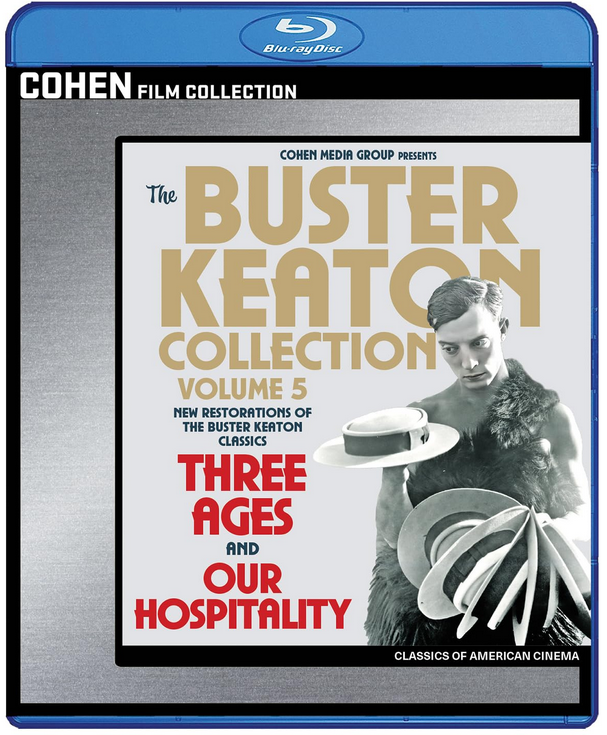
“THE
BUSTER KEATON COLLECTION, VOLUME 5”
(Three
Ages: 1923; Directed by Buster Keaton and Eddie Cline)
(Our
Hospitality: 1923; Directed by Buster Keaton and John G. Blystone)
(Cohen
Film Collection)
“KEATON
CLASSICS DOUBLE FEATURE”
By
Raymond Benson
The
availability of Buster Keaton on Blu-ray can be a head-scratcher. Kino Lorber
seems to have the monopoly on Keaton’s features and shorts, but the puzzlement
comes with more than one release of certain titles in Kino’s catalog of disks for
sale. Add to this befuddlement is the Cohen Media Group and their Cohen Film
Collection’s ownership of Keaton’s library. Cohen has also released Keaton
Blu-ray disks—and they’re distributed by Kino Lorber! (And still others
are released by Eureka Entertainment, licensed by Cohen!) Which editions are we
supposed to get?
A
new Cohen Film Collection release, available from Kino Lorber, is The Buster
Keaton Collection, Volume 5, which includes a double bill of the master
filmmaker’s 1923 features—Three Ages and Our Hospitality. (Also
available from Cohen Film Collection are Volumes 1 – 4, which likewise
contain double bills of Keaton’s features from the 1920s.)
Here
on the Cinema Retro site, I reviewed the Kino Lorber release of Our
Hospitality in 2019. Apparently the Kino versions are different
restorations from the Cohen’s restorations. The latter are performed by Cineteca
di Bologna as part of Cohen’s “Keaton Project.” Long ago, Cohen Media Group
acquired the rights from the Keaton estate, even though other companies have
had access to them. I won’t even attempt to sort out the rights issues here. Just
know that the Kino Our Hospitality disk had bonus features, whereas the
Cohen Film Collection double bill discussed here does not contain any
supplements aside from Cohen’s own trailer of Our Hospitality release
and other Cohen releases.
That
said, the Cohen restorations by the Keaton Project are likely the best to come
about. They look marvelous. Bonus features? Who needs supplements when the
feature films are the best quality available?
Three
Ages was
Buster Keaton’s first feature film (not counting The Saphead, 1920, in
which he only starred). Co-directed with Eddie Cline, Keaton presents the
“story of love,” i.e., courtship, in three different time periods—the stone
age, the Roman age, and modern times (the 1920s, of course). The same cast
portrays the same character types in each story, and the film narrative jumps
back and forth between these time periods throughout the run of the picture. Keaton
stars as the “lesser” man when compared to his more attractive, manly, and
wealthier rival played by Wallace Beery. The woman who is the object of both
men’s affection is played by Margaret Leahy (the actress made only one film,
and this is it). Beery’s character is a bully, and Keaton must overcome the
man’s physical strength and social standing with cunning and trickery. There is
certainly amusement and clever bits here, but Three Ages could be called
baby steps for Keaton as a feature filmmaker when compared to later works. Three
Ages was perhaps the Keaton film most in need for preservation, as there
are many instances—a few seconds here and there—in which visual elements are
deteriorated. The restoration folks have done the best they could, and this is
probably the finest you will ever see Three Ages. The lively score for
this release is composed and conducted by Rodney Sauer.
Of
more importance and interest is Our Hospitality, considered one of
Keaton’s greatest works, and it was only his second feature (it is co-directed
by John G. Blystone). The story takes place in the early 1800s and draws upon a
rural family feud like the Hatfields and McCoys—in this case the McKays and
Canfields. When patriarch John McKay is killed by James Canfield (and vice
versa), Mrs. McKay flees with little baby Willie McKay (played by Buster’s
real-life infant son, Buster Keaton Jr.). Twenty years later, Willie inherits
the old family estate in the south and returns to claim it, only vaguely aware
of the feud that has existed for decades. On the way he meets Virginia (played
by Keaton’s wife at the time, Natalie Talmadge), who happens to be a Canfield.
Upon arrival at home, Willie continues to court Virginia, but her brothers
won’t have it. The rest of the picture is a cats-and-mouse game of Willie
avoiding being killed and at the same time wooing the woman he wants to marry.
There
are many striking aspects about the picture. Keaton’s paid great attention to
detail in the design and location shooting. Apparently, he took great pains to
create realistic locomotives and tracks that depicted early train development
in America (although he played with time period accuracy for the sake of more
interesting visuals). The final act contains some spectacular and hair-raising
stunt work by the star, including an incident of falling into rapids and almost
drowning on camera. Mostly, though, the story is well-constructed, the
characters have more depth than in the other silent comedies of the day, and,
in the end, Our Hospitality is one of Keaton’s most satisfying movies.
Interestingly,
it’s the only Keaton film to feature three generations of Keatons—Buster
himself, his previously-mentioned son, and his father, Joe Keaton, as a train
engineer.
The
Cohen presentation here is gorgeous and near perfect. Carl Davis supplied the
wonderful musical score that accompanies it.
For
Buster Keaton fans, you can’t go wrong with this double bill release (nor with
the Cohen Film Collection’s other four volumes). Highly recommended.
Click here to order from Amazon
